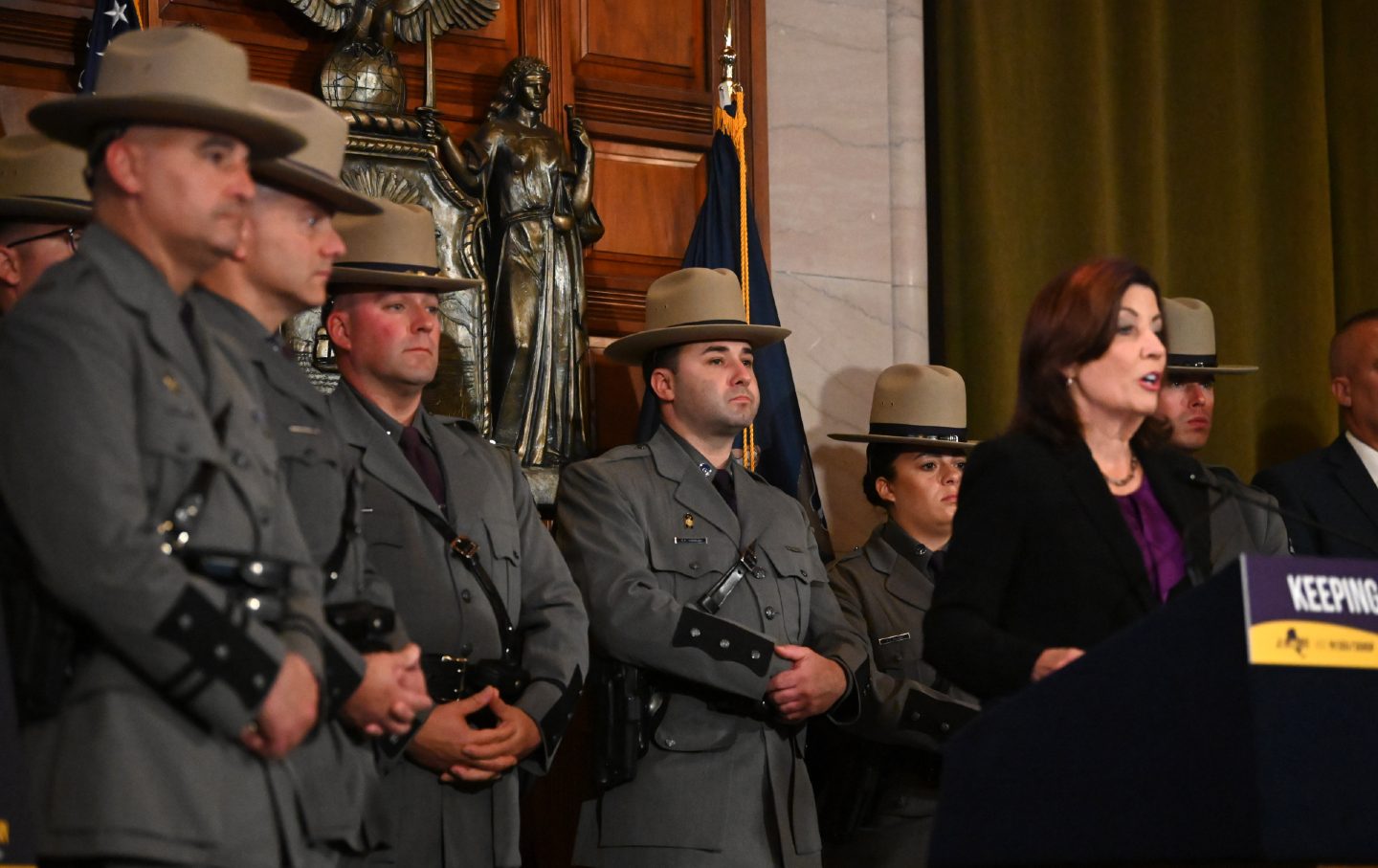The Federal Judiciary Has a Gerontocracy Problem
From district courts all the way up to the Supreme Court, judges are refusing to retire, holding on to power well past their prime.

Judge using gavel in court (focus on foreground, blurred motion)—stock photo
(Kelvin Murray / Getty Images)
An excellent report from NBC News highlights a serious problem with our federal judiciary: Its members are aging, and those that have been there longest don’t want to give up power.
There are currently 870 active federal judges, and 104 of them are eligible to retire, but refuse to do so. That means that 12 percent of the judiciary is over 65, has been in power for at least a decade and a half, yet refuses to move on. According to the report, 14 of those judges are older than Joe Biden, and that is interesting given that Biden just treated the country to such a master class in torch passing that they’ll probably try to copy it in the 2030 Olympics.
While Biden succumbed to intense public outcry to abandon his attempt to secure another term in office, federal judges with the power to block Biden’s (or anybody else’s) agenda face almost no public pressure to relinquish power, clear space for the next generation, or even prove that they are still cognitively able to do their jobs at the highest level.
The stubborn refusal of federal judges to cede power is one reason term limits are so popular with the American public. A recent poll showed that 70 percent of adults supported putting limits on judges’ time in office—and those adults even include Republicans; according to the data, a solid 56 percent of them support the idea.
Last month, President Biden made news when he proposed setting an 18-year term limit on Supreme Court justices, and that proposal was quickly endorsed by Vice President Kamala Harris and the Democratic Party more broadly. The idea is to stagger those terms, meaning that one person on the nine-member Supreme Court would be term-limited out every two years.
Despite their popularity, there are constitutional problems with term limits. I’ve laid them all out in the past, but briefly put: The Constitution says that federal judges serve for life and, absent impeachment, there’s no obvious way to force out a Supreme Court justice who wishes to hang on to their job until they slip this mortal coil. Still, there is a potential work-around to authorize term limits without a constitutional amendment. While the Constitution says that federal judges serve for life, it doesn’t say where in the federal judiciary they must serve.
The solution to make term limits constitutional has already been tried on other federal courts. It’s called “senior status” and it’s a form of semiretirement offered to federal judges who have reached the age of 65 and served at least 15 years on the bench. They retain their full salary (as required by the Constitution) and can continue to sit on their circuit court and participate in cases. But their “seat” on the circuit opens up, and the president can appoint—and Congress confirm—a new judge to fill their slot. Senior status limits the lifetime power of federal judges, without violating any constitutional principle.
The problem with senior status, as the NBC report shows, is that it is voluntary. Federal judges are not forced into semiretirement but merely given the option. And when we look at how that optional choice plays out on the lower courts, it’s pretty clear that it’s not working. If the Democrats under a Harris administration are going to push forward term limits for the Supreme Court, they might as well reform the senior-status process on the lower courts as well.
Of the 104 judges who could enter into semiretirement, 78 were appointed by Republican presidents. Frankly, I can’t criticize these people too much, because, like Republicans, I understand the strategic importance of timing when it comes to judicial retirements. In our current system, it’s functional malpractice to retire under the administration of the opposite party. While judges like to claim they’re above partisanship—and are loyal only to the law—the reality is that there are Democratic judges, and there are Republican judges, and most of them do everything they can to retire or take senior status under an administration that shares their values.
If anything, the Republican judges who’ve refused to retire under Biden are just underscoring how politicized the entire federal judiciary has become—and how desperately the system is in need of reform. A judge’s best, most politically responsible option should not be to hang on into their 70s or 80s just waiting for the right administration to appoint their replacement.
As for the 26 judges appointed by Democratic presidents who have refused to retire under Biden… I have nothing but the harshest criticism. Biden’s judicial appointments have been astounding, for the most part. His judges have been impeccably qualified, diverse, and have come from all different backgrounds in terms of education and experience. And both Senate majority leader Chuck Schumer and Senate Judiciary chairman Dick Durbin have been effective at getting Biden’s nominees across the finish line to confirmation. There is simply no good reason for a Democratic judge to hang on, other than their ego and outsize sense of self-importance.
The point of term limits (and forced semi-retirements) is not just to cut the lifetime power of federal judges. The point is to take the balance of partisan power in the federal judiciary out of the hands of folks who can’t think of anything better to do in their golden years—and put the power back where it belongs, in the hands of voters. A system with staggered terms leads to regular, planned judicial appointments. It takes “strategic” retirements out of the mix and guarantees that every president has the opportunity to appoint a set number of judges. Over time, this would mean that the judiciary would reflect which party wins elections, instead of reflecting which judges were smart enough to retire at the opportune moment.
Critics of term limits, including Senate minority leader Mitch McConnell—yet another octogenarian who won’t go fishing like a normal old person—have said that term limits threaten “judicial independence.” Their theory is that term limits will create a situation in which judges are so concerned about their next job that they will make rulings designed to set themselves up with lucrative gigs once their time on the bench is through.
McConnell’s argument, however, fails at almost every level. First of all, we’re talking about senior status, which means that judges retain their full salary. Now, I appreciate that some judges don’t think they’re being paid enough, and some judges have found corrupt ways to supplement their income, but the potential lure of the next big-money job is no different for active judges than it is for senior judges. Every single member of the federal judiciary could double (at least) their salary at a law firm of their choosing. No judge, except perhaps Clarence Thomas, is in it for the money.
Moreover, the kinds of jobs that most retired federal judges are likely to want and get are not exactly the jobs that lead to corrupt judicial decision-making. I simply do not think a judge would think, “Well, I can’t rule the way I want to in this case because I might not be able to be a law professor in 18 years.”
Finally, we are talking about people who have reached the age most Americans retire if they’re lucky enough to be able to afford to retire. If McConnell really thinks the threat of impending retirement is so financially compromising as to cause a person to make corrupt deals while they still have a job, perhaps McConnell should join the Democrats and invest more money and resources in Social Security.
Popular
“swipe left below to view more authors”Swipe →I’m not sure how to make term limits constitutional from the perspective of the justices on the Supreme Court who would have to approve this limitation to their lifetime power. But if we’re somehow going to apply term limits to the Supreme Court, we should also apply them to the entire federal judiciary. The current senior-status system isn’t really working, as it’s leaving too much power in the hands of people who are too selfish to make way for the next generation of judges.
The grim reaper is slowly loosening the iron grip of the baby boomer gerontocracy. The time to reform our system so we don’t repeat our mistakes is now.
I don’t know what will happen to my reformer instincts when I am 70 years old, but I can only assume, based on the evidence of my elders, that I will come to view keeping my job as somehow critical to the proper functioning of society. I will be wrong, but good luck convincing me of that. When I too lose the plot, I hope somebody allows me to keep my full salary while they gently ease me off to the side to make way for the future.
Hold the powerful to account by supporting The Nation
The chaos and cruelty of the Trump administration reaches new lows each week.
Trump’s catastrophic “Liberation Day” has wreaked havoc on the world economy and set up yet another constitutional crisis at home. Plainclothes officers continue to abduct university students off the streets. So-called “enemy aliens” are flown abroad to a mega prison against the orders of the courts. And Signalgate promises to be the first of many incompetence scandals that expose the brutal violence at the core of the American empire.
At a time when elite universities, powerful law firms, and influential media outlets are capitulating to Trump’s intimidation, The Nation is more determined than ever before to hold the powerful to account.
In just the last month, we’ve published reporting on how Trump outsources his mass deportation agenda to other countries, exposed the administration’s appeal to obscure laws to carry out its repressive agenda, and amplified the voices of brave student activists targeted by universities.
We also continue to tell the stories of those who fight back against Trump and Musk, whether on the streets in growing protest movements, in town halls across the country, or in critical state elections—like Wisconsin’s recent state Supreme Court race—that provide a model for resisting Trumpism and prove that Musk can’t buy our democracy.
This is the journalism that matters in 2025. But we can’t do this without you. As a reader-supported publication, we rely on the support of generous donors. Please, help make our essential independent journalism possible with a donation today.
In solidarity,
The Editors
The Nation








